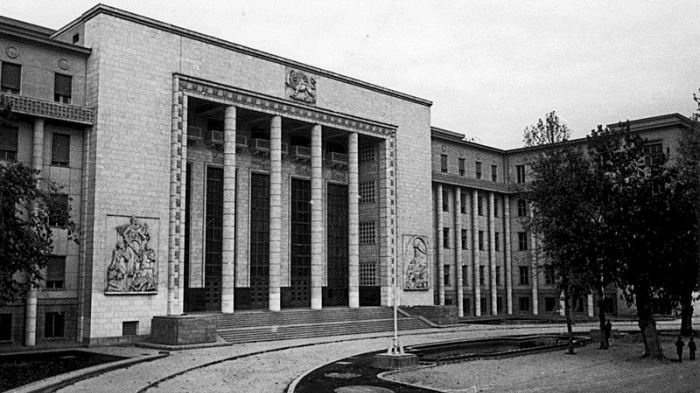Rouhani Orders Enforcement of New Law on Political Offences

(Picture: The Courthouse of Tehran)
Iranian President Hassan Rouhani has ordered the interior and justice ministers to enforce the law Iran’s parliament passed on January 24 defining political offences. The law guarantees public trials for those accused of such offences.
While Iran’s constitution provides for public trials and other legal protections for people accused of political crimes, but these had never been defined.
Last year in late January, Hassan Rouhani expressed hope for legal definition of political offences to be finalized during his term as the President. Sadegh Zibakalam, a prominent reformist commentator, immediately wrote an open letter to Rouhani saying it would take several other thirty-six-years for the establishment to come to a consensus on the issue. Criticizing the officials’ spirit of intolerance, he argued in his letter that there is no such thing as political crime. However, the term has been codified into an act now and most observers consider it as a step forward.
In the words of Mohammad-Ali Esfanani, the spokesman of the legal and judicial committee of the Ninth Parliament, whose term ended in less than one month ago, different administrations have had opposite views regarding criminal acts and that explains why post-Revolution administrations have been reluctant to define political offences in the fear that it might limit their own discretion. Despite the fact that the Rouhani administration’s agenda has been more focused on foreign policy (hence criticized for its passive attitude toward domestic policy) the president, who boasts his academic background in law, was an oddity from the very beginning of his presidential campaign when he promised for a more open atmosphere and due respect for civil rights. Now, he has keepsake from the Ninth Majlis, one that makes a real difference.
To prepare the law that has now become binding, the judicial committee of the parliament had convened on several occasions with the ministers of intelligence and justice, police commanders and judicial authorities to reach a consensus on the definition of political offence.
Insults or defamations against senior officials in their capacity as office-holders are considered political offences provided that they are not intended to undermine the establishment. The long list of officials includes the heads of the three branches of government, the Expediency Council, vice presidents, ministers, lawmakers, members of the Assembly of Experts and the Guardian Council.
The lines between political offences and security charges remain blurred by such definitions but the fact that a board of trustees will be in charge of deciding, in open tribunals, whether an offence is political or not can contain subjectivity on the judicial side. Still many observers believe the definition violates civil rights and limits the critics’ freedom.
However, articles that discuss perpetrators of political crimes and their rights are real improvements. Rights have been bestowed to those accused or convicted of political crimes: the law obligates their place of custody to be separated from ordinary offenders. It also bans wearing political prisoners uniforms. There is a prohibition on provisions prescribed for recidivism and political offenders are non-extraditable, too. The law further envisages a ban to keep political prisoners in solitary detention for more than fifteen days with the stipulation that judicial authorities consider it necessary for investigations. The rights to visitation and correspondence with first-degree relatives during detention are also recognized in the new law. The so-called political prisoners will be also granted access to books, journals, radio and television.
“Breaches of law committed against state ... bodies or internal and foreign policies of the country, as long as they are committed to achieve reforms and not intended to target the system, are considered political crimes,” read another of the law’s articles.
Though the long-awaited breakthrough has been hailed as a significant step forward in recognizing the rights of political activists, many believe that the law does not go far enough. The Rouhani administration’s achievement is the ultimate fulfilment of more than three decades of legal and political debates, or at least a very good starting point.
Back in January when the law was passed in Majlis, Majid Ansari, Rouhani’s vice president for parliamentary affairs, said the government viewed the law as a positive step, but one that did not go far enough because it did not provide enough detail. “The proposed law does not have sufficient breadth, because defining political crimes is a difficult task,” Ansari told lawmakers.

